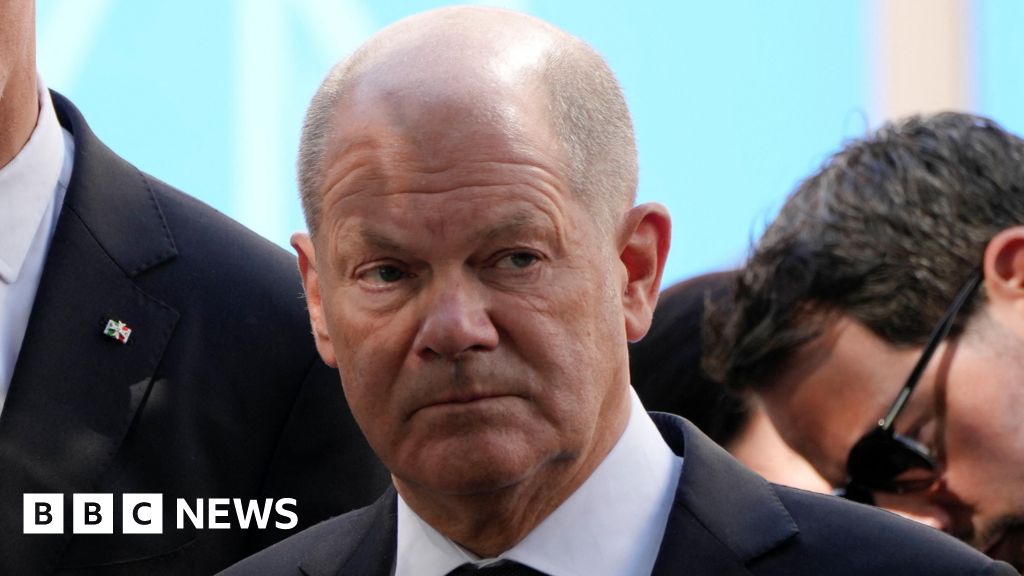
The German chancellor, Olaf Scholz, has urged mainstream parties not to lend support to the far-right Alternative for Germany (AfD) party, which won a big victory in the eastern state of Thuringia in Sunday’s regional election.
The result gives the far right its first win in a state parliament election since World War Two.
The AfD also came a close second in Sunday’s other big state election, in the more populous neighbouring state of Saxony.
The AfD has been designated as right-wing extremist in both Thuringia and Saxony. Björn Höcke, the AfD leader in Thuringia, has previously been fined for using a Nazi slogan, although he denies knowingly doing so.
On Monday, Mr Scholz urged other parties to block the AfD from governing by maintaining a so-called firewall against it.
“All democratic parties are now called upon to form stable governments without right-wing extremists,” he said, calling the results “bitter” and “worrying”.
AfD co-leader Alice Weidel said that voters in Thuringia and Saxony had given her party a “very clear mandate to govern”.
She urged parties to ignore Mr Scholz’s call to build government coalitions without the AfD, and said that doing so would “undermine the democratic participation of large sections of the population”.
“Firewalls are undemocratic,” Ms Weidel added.
Without the support of other parties, the AfD cannot govern in Thuringia. The second-largest party, the conservative CDU, has made clear it will not consider ruling with the far right.
Mathematically, then, the conservatives will need support from parties on the left to form a majority.
They have previously refused to work with the left-wing Die Linke, meaning they could have to look at the more radical left populist Sahra Wagenknecht’s BSW to form a ruling coalition – an unpalatable option for many within the CDU.
Mr Höcke, the AfD’s top candidate in Thuringia has suggested there were plenty of CDU voters who would be happy if they worked together instead.
In any case, with over 30% of the vote the AfD has a so-called “blocking minority” – meaning it will be able to stop the appointment of new judges or any constitutional change.
Any coalition that emerges is likely to be highly unstable.
In Saxony, the conservatives won 42 seats, just ahead of the AfD with 41, while Sahra Wagenknecht’s party is in third with 15 seats.
In Thuringia, Mr Scholz’s Social Democratic Party (SPD) won just six seats, with none for his coalition partners the Greens and the liberal FDP. The SPD also fared badly in Saxony, where it came fifth.
The elections underlined the unpopularity of Germany’s ruling “traffic-light” coalition, so named because of the red, yellow and green of the party colours.
Each of the three governing parties did badly, meaning they will fight their corner in the national coalition even more assertively.
Already leading figures within each party are saying they need to stand up for their own values. This will likely lead to more rifts within the national government. Ministers are saying they won’t break up the coalition, and bring down the government – but the fact they are saying this at all is a sign of how difficult things are within the coalition.
Ms Weidel said people “voted out” the coalition and called on Mr Scholz and his partners to “pack their bags and vacate their chairs, because the voters want a different government, they want a different politics”.
The biggest issue for AfD voters on Sunday was immigration, and in particular the issue of refugees and asylum.
Even though the AfD is still blocked out of governmental power both in the regions and nationally, the party does have an impact on mainstream politics.
When the AfD entered the Bundestag in Berlin in 2017 critics say their fierce anti-migrant rhetoric coarsened the debate.
Some believe the discourse in politics and the media has become more aggressive, and CDU leader Friedrich Merz is accused of aping AfD rhetoric.
Either way, to win back AfD voters mainstream parties are talking tougher on issues like migration and pushing through measures to make it easier to deport asylum seekers whose application has been rejected.
The federal chairwoman of the umbrella organization of Turkish communities in Berlin, Aslihan Yesilkaya-Yurtbay, said that the results of the elections were “shocking and frightening”. She added that many younger people of her generation are already planning to leave Germany.
“The future in this country for citizens with a migration background is being called into question,” she said.
The AfD also wants to stop weapons supplies to Ukraine, as does Sahra Wagenknecht’s BSW.
Some five million Germans in the east were eligible to vote on Sunday.
A third eastern state, Brandenburg, is due to vote in three weeks’ time and although the AfD is ahead in the opinion polls, the Social Democrats and conservatives are only a few points behind.
